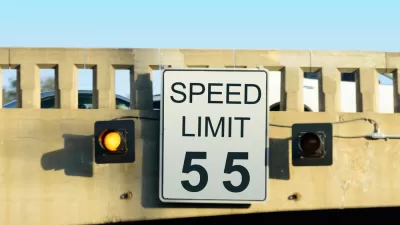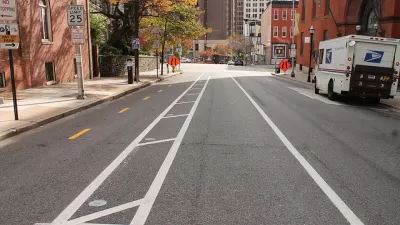Land use regulations provide exhibit A in this indictment of the American legal system's support for a murderous and destructive dependence on automobiles for transportation.

Gregory H. Shill, an associate professor of law at the University of Iowa College of Law, writes for The Atlantic about how the laws and regulations of the United States force Americans to drive.
According to Shill, "over the course of several generations lawmakers rewrote the rules of American life to conform to the interests of Big Oil, the auto barons, and the car-loving 1 percenters of the Roaring Twenties."
"Land-use law, criminal law, torts, insurance, vehicle safety regulations, even the tax code—all these sources of law provide rewards to cooperate with what has become the dominant transport mode, and punishment for those who defy it," writes Shill.
Shill starts the detailing of these claims by focusing on local land use regulations. Other laws relevant to planning, like the 85 percent law used to set speed limits, are also detailed.
The consequences of what Shill calls "auto supremacy" are tragic: "In a country where the laws compel the use of cars, Americans are condemned to lose friends and relatives to traffic violence." Added to the 40,000 people killed and 4 million injured, are the effects of climate change and air pollution.
Shill's writing for The Atlantic previews a larger journal article published in June, titled "Should Law Subsidize Driving?"
FULL STORY: Americans Shouldn’t Have to Drive, but the Law Insists on It

Maui's Vacation Rental Debate Turns Ugly
Verbal attacks, misinformation campaigns and fistfights plague a high-stakes debate to convert thousands of vacation rentals into long-term housing.

Planetizen Federal Action Tracker
A weekly monitor of how Trump’s orders and actions are impacting planners and planning in America.

San Francisco Suspends Traffic Calming Amidst Record Deaths
Citing “a challenging fiscal landscape,” the city will cease the program on the heels of 42 traffic deaths, including 24 pedestrians.

Adaptive Reuse Will Create Housing in a Suburban Texas Strip Mall
A developer is reimagining a strip mall property as a mixed-use complex with housing and retail.

Study: Anti-Homelessness Laws Don’t Work
Research shows that punitive measures that criminalized unhoused people don’t help reduce homelessness.

In U.S., Urban Gondolas Face Uphill Battle
Cities in Latin America and Europe have embraced aerial transitways — AKA gondolas — as sustainable, convenient urban transport, especially in tricky geographies. American cities have yet to catch up.
Urban Design for Planners 1: Software Tools
This six-course series explores essential urban design concepts using open source software and equips planners with the tools they need to participate fully in the urban design process.
Planning for Universal Design
Learn the tools for implementing Universal Design in planning regulations.
Heyer Gruel & Associates PA
JM Goldson LLC
Custer County Colorado
City of Camden Redevelopment Agency
City of Astoria
Transportation Research & Education Center (TREC) at Portland State University
Jefferson Parish Government
Camden Redevelopment Agency
City of Claremont





























